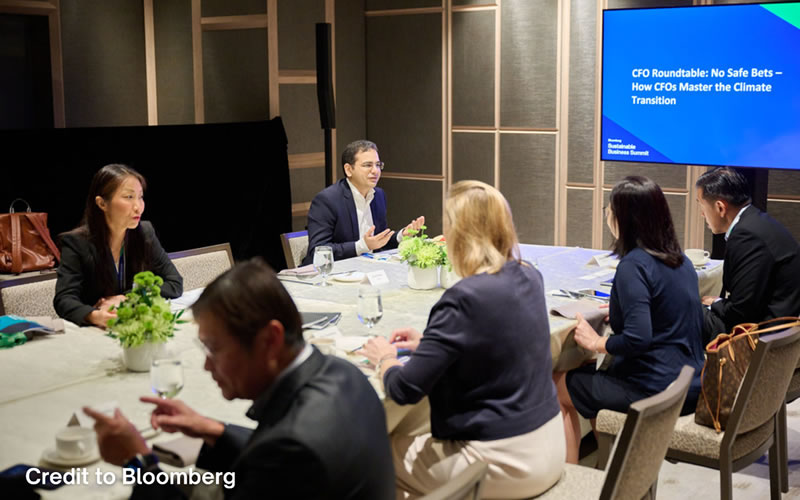1 August2025
CFOs at the Frontline of Climate Action

On July 30, ChemOne’s Chief Financial Officer, Mayank Vishnoi, participated in an exclusive CFO Roundtable at the Bloomberg Sustainable Business Summit in Singapore. This session, titled “No Safe Bets – How CFOs Master the Climate Transition,” brought together senior finance leaders from various industries with companies such as Siemens, Prudential plc, and Lombard Odier Group to discuss how CFOs are leading climate strategies amid global policy uncertainty, investor pressure, and evolving regulations, balancing risk and opportunity to future-proof their businesses in a carbon-constrained economy.
Moderated by Bloomberg’s Nina Trentmann and Erik Schatzker, the discussion explored how CFOs are navigating ESG priorities, adapting to shifting capital expectations, and addressing the realities of transitioning toward low-carbon growth models.
Mayank Vishnoi shared several key perspectives on the evolving responsibilities of CFOs in driving climate action.
First, ESG is now a central priority in boardrooms, consistently ranking among the top strategic considerations.
As Mayank put it, CFOs today must “continuously learn, unlearn, and adapt.” Their role extends beyond reporting financial performance to leading with intent and translating ESG goals into long-term enterprise value.
Secondly, the global conversation is moving beyond distant net-zero targets and focusing on pragmatic, step-by-step transition pathways. In an environment shaped by supply chain disruptions, policy shifts, and market volatility, companies must rethink how to implement climate strategies that deliver real impact.
Mayank emphasized that “transition strategies that are credible, implementable, and responsive to local realities will be the differentiators going forward.”
Third, ESG is no longer simply a differentiator—it is a gateway, Mayank said. As financial markets intensify their focus on ESG compliance, particularly in infrastructure and energy, being ESG-aligned has become foundational.
He highlighted ChemOne’s flagship project, the Pengerang Energy Complex (PEC) as an example of ESG being embedded from the ground up: “This is a critical enabler, not just for resilience, but for access to global capital,” he said
Reflecting on global standards and local realities, Mayank stressed the importance of harmonized ESG frameworks that are both globally benchmarked and locally adaptable.
Whether dealing with carbon pricing, regional regulations, or mandates for renewable fuels, he underlined that any successful framework must “strike the right balance: globally benchmarked for consistency, yet locally adaptable for relevance and impact.”
Another essential topic discussed was the commercial viability of climate action for both private and public sectors where he posed a critical question:
“Are customers truly willing to pay for greener, more sustainable products? If not, how do we design incentive structures that make climate action commercially viable?” This challenge remains at the forefront as companies and policymakers seek to align sustainability with business realities.